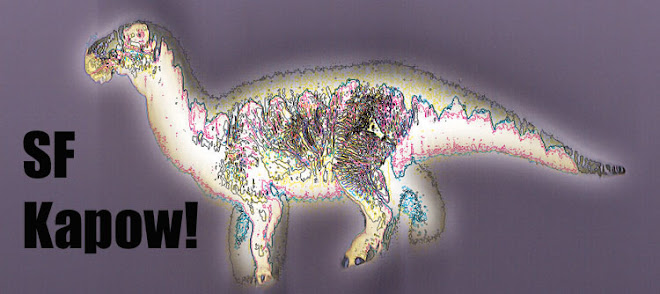The title character is a street urchin when we meet him, with a gift for thieving and deceit. He's so good at it, in fact, that he's being sold by his current owner/unsuitable parental substitute, the Thiefmaker, to a crooked priest. While the Thiefmaker runs a sort of wholesale Fagin-style operation in training orphans for crime, the priest, Father Chains, is running a boutique business. He needs clever apprentices who can be trained for the long con.
The story follows Locke through intercut scenes, part in the present as he and his band of thieves try to gull a rich nobleman and avoid a brutal gang war, and part in the past as we see how he and the gang grew up and trained together.
All the characters are vivid, particularly Father Chains, a priest of "the thirteenth god," the god of thieves and swindlers. There's also Jean Tannen, Locke's portly best friend who happens to be lethal with a pair of hatchets, the card sharking Sanza twins, and Bug the adolescent apprentice of the gang. Their gang moves through the city of Camorr, a Venice-like creation peopled by nobles, gang leaders, thugs, merchants, assassins, shark-fighters, priests, and guards. Camorr itself is one of the most memorable characters, with its numerous islands and canals, and its mysterious glass-like structures left by a vanished elder race. (I'd say it has about 700 milli-Crobuzons.)
Locke's character, or lack thereof, is at the centre of the story. He's physically a little short and slight, with a forgettable face, no particular skill with weapons or hand to hand combat, no magical ability, and no noble title or destiny handed down by the gods. He's just too clever for his own good, and very skilled at deception and fast talking. Part of the time, he reminded me of a trickster figure like Loki or Coyote, morally ambiguous and talking his way in and out of ever problem he encounters. In modern speculative fiction, Locke most closely resembles Miles Vorkosigan, from Lois McMaster Bujold's Vorkosigan series. It's refreshing to see characters in genres (fantasy and military SF, respectively) who usually rely on brawn and machismo using their brains and mental toughness, instead. (And if you liked Locke Lamora and you haven't read any Vorkosigan books, boy, are you in for a treat. Get yourself to the library right now. You'll thank me for this.)
Are there problems with the book? Yes, of course. There's the love of Locke's life, who is mentioned frequently but doesn't even get a cameo in one of the flashbacks, which makes the book feel less than whole. If you like moral characters, you may be troubled by Locke's utter lack of most ethics; his primary motivations are loyalty, revenge, and a need to outsmart people. There are also moments that stretch believeability thin, even in a novel like this; a sequence in which Locke tries to infiltrate the same building three times in three different disguises in one day comes to mind.
Still, those are minor problems compared to the book's primary virtue: it is fun. This book is swashbuckling, an updated successor to the novels of Sabatini or The Princess Bride. Looking back over the past half dozen SF and fantasy novels I've read, the number that is just fun is sadly small. Books that inspire a grin should be treasured.

No comments:
Post a Comment